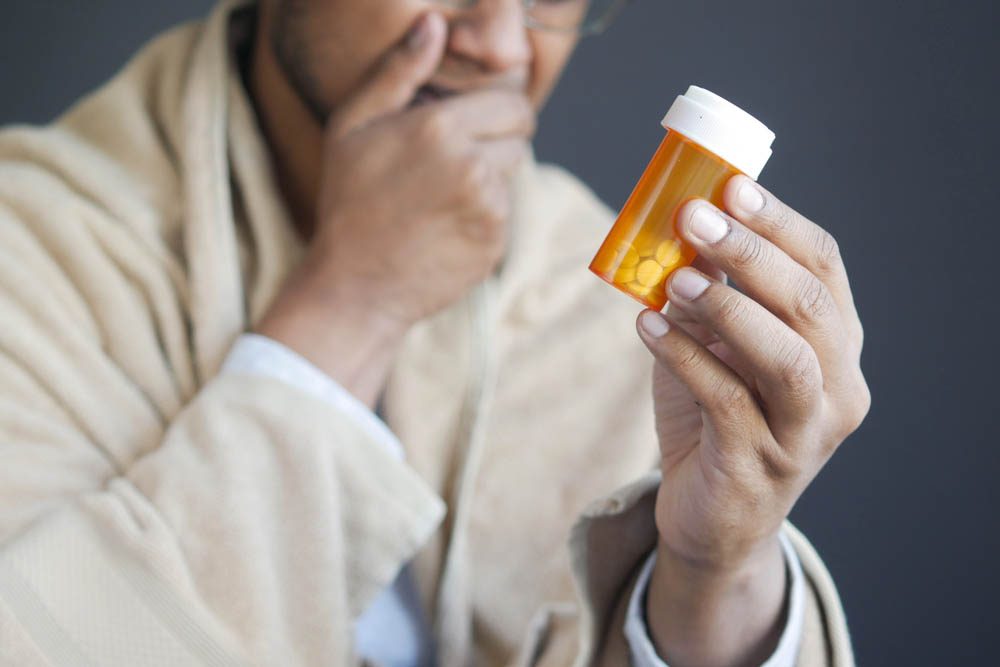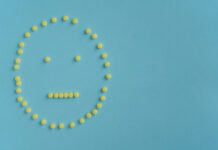According to a new study, about half of those who take antidepressants have tried at least two drugs without success. About a third have tried four drugs without success. The study illuminates the frustrating experience of these people, who are euphemistically labeled “treatment resistant” because multiple antidepressant drugs have failed to work for them.
“Qualitative findings revealed severe emotional distress and frustration with existing treatments, as well as organisational and illness-related barriers to effective care,” the researchers write.
The study was led by Kiranpreet Gill and Danielle Hett at the University of Birmingham, and published in The British Journal of Psychiatry.
According to the CDC, 13.8% of American adults had an antidepressant prescription in 2018 (18.6% of women; 8.7% of men; 24.3% of older women). This has likely only increased since the treatment boom during the Covid-19 pandemic.
This means that tens of millions of Americans every year are experiencing the side effects of antidepressant drugs without improvement, trying multiple drugs, and becoming labeled as “treatment resistant” when the drugs don’t work.
















Hmmmm…. So 85% of “untreated” depressed people recover spontaneously. But half of those “treated” with antidepressants DON’T recover. How about we stop using the term “treatment resistant depressant” and start using the term “ineffective drug treatment?” Seems the average depressed person is far better off staying far away from “antidepressants!”
Report comment
“According to the researchers, those with TRD had cardiovascular problems, functional decline, substance abuse, anxiety, and were labeled with personality disorders.” And then they got tardive dysphoria, while probably being surrounded by clinicians who act like programmed robots promoting yet another drug for treatment rather than looking at their (the patient’s) life and seeing that these people need something else besides acting like a pill (or shock therapy) is going to change your history. How oblivious do these clinicians have to be to what’s really going on with a human being to facilitate all of this? And I’m not surprised given what so many people believe. What they think will give them entrance to heaven for example because someone or some book told them that’s how it works. Well just hand them a pill and get a bunch of brainwashed people to repeat the superstition….
Report comment
But did they really recover or are they self medicating with other things?
Report comment
Sorry, not a relevant question. The AD’s did not work, whatever other means they may be using to cope. That’s the point. If you are more likely to recover without antidepressants than with them, then it’s not that they are “resisting treatment.” It means the “treatment” does not work!
Report comment
Why stop at questioning whether they self-medicated? Why not have the premise that then they’ve learned not to see sadness as a disease simply accepted it and it went away, as if there’s something wrong with that? Why not have the premise that a situation that is labeled as good for them like going to church or always believing what the teacher says all the time or the boss that they have stopped with such and there is something wrong with that? Clearly I’m being sarcastic. Furthermore antidepressants mess around with neurotransmitters the same as street drugs or what you call self medicating. There’s no proof that they treat any serotonin deficiency in fact in the end they cause serotonin deficiency because the body stops making as much when the re-uptake is inhibited. And you have the same problems with withdrawal symptoms and with antidepressants that can be extremely difficult as well as having to deal with clinicians that instead of helping with withdrawal symptoms or being at all educated in how to relate that as a recurrence of a disease they label as a chemical imbalance. There is no real substantive proof that depression comes from a chemical imbalance, however there is substantive to proof that the medications used to treat depression which is labeled as a chemical imbalance do not treat a chemical imbalance but cause one that did not exist before. Again there is no real substantive proof that depression comes from a chemical imbalance. That is science.
Report comment
For a sizable portion of patients it is clear that antidepressants are very helpful and integral to their recovery. I am one of them. These medications saved my life. To date I have taken them for forty years.
Report comment
They don’t help everyone.
Report comment
I’m sorry but “a sizable portion” is not a scientific term, nor is it objective. The statistics HERE in this article shared ARE objective and scientific. As well as that in the long term antidepressants correlate with MORE relapsing: https://pmc.ncbi.nlm.nih.gov/articles/PMC4970636/#:~:text=Furthermore%2C%20a%20study%20of%20antidepressant,using%20adequate%20dosages%20of%20antidepressants.&text=Patients%20not%20treated%20with%20antidepressants,lowest%20recurrence%20rate%20(26%25). How they can cause sexual dysfunction: https://www.madinamerica.com/2024/10/antidepressants-linked-to-lasting-sexual-dysfunction-study-finds/ https://www.health.harvard.edu/womens-health/when-an-ssri-medication-impacts-your-sex-life How they barely show to work more than placebo, while there are numerous questionable things going on with the trials that show thus https://www.medicalnewstoday.com/articles/325767 https://www.madinamerica.com/2022/08/antidepressants-placebo-caution/ https://www.madinamerica.com/2022/08/antidepressants-no-better-placebo-85-people/ When in clinical trials, people have to be put on more than just the antidepressant but also on a sedative because of akathisia this isn’t a trial for antidepressants anymore it’s a trial for two medications; when anyone getting better in the initial period or a few weeks, from the control, group is taken out of the reckoning; when often those in the non control group (those GETTING the medication being tested), have to be taken out of the reckoning because they left the experiment because of severe side effects, when the weeks after the experiment when those in the non control group had to get off of the medications and had SEVERE side effects isn’t reported; when there were who knows how many trials and ANY trial not showing the results wanted were discarded; when then given all of that STILL there was only a marginal efficacy which often isn’t even considered therapeutic, then we really DO have problems.
And when simple data is shared, and this is questioned by someone like Silvia Price trying to stereotype the people that got better without treatment as self medicating, as if the general public that simply doesn’t go for an antidepressants suddenly is full of self medicating people when 85% get better without any treatment such, or the use of the term “sizable portion” to avoid looking at the real statistics and what happens to people that DO NOT get helped, this starts to show that there is a lack of perspective, as well as bias.
When antidepressants work for you, or anyone else, this DOES NOT change the statistics regarding the general public nor does it excuse it. Nor is it objective, or science!
Report comment
So 50% isn’t a large enough statistic to break the false dichotomy for these fact-and-figure-driven docs?
Report comment
Why don’t doctors ever question themselves and their treatments? If they suspect a treatment isn’t working, why not question the treatment itself instead of throwing shade at the patient?
Report comment
This inability of doctors to see that it an AD prescription may be ineffective is the main reason my son was killed. Ineffective, so the dosage was raised 10, 20, 30, 40 mg fluoxetine. At 15, he felt sad over friend issues. A clinical counsellor said you need AD, and “not telling my dad is a good option”, he texted a friend. A “family” MD put him on fluoxetine immediately and raised the dosage over and over. A child psychiatrist saw him over Zoom and labelled feeling sad as “mental illness”. Dexter’s last message to a friend, as he was handed a 40 mg prescription, said he was told “stronger” would “cure”. No need to tell your dad. “I would tell my dad but it’s gone on too long and it’s embarrassing.”, he texted. Then days later, without a word, note, or symptom anyone could see, he killed himself at 15, in the room next to me. Medical authorities deemed it acceptable. I’ve now written over a hundred pages of complaints. Meanwhile, other patients are told they need a higher dosage or a different AD, but the negative effects increase in response to dose even though positive results do not. So it happens again. Dexter was destined for both music and medical school, ironically, and planning his rich life. Ramping up ineffective AD kills.
Report comment
I wish I knew what to say, I just cry reading this…..
Who is really mentally ill, the patient or the rest of them…..(!?)
They can’t see what they are doing to another person, to society!????
They can’t even read the warning labels?
They can’t see what the negative effects are?
They say they are helping a person, but they don’t even have the ability to actually
provide the space for that person to unburden himself?
I don’t know what to say about it. Their “ideology” is more non reality based, than the people they decide are “mentally ill.”
And they make someone feel there’s something wrong with them, as if when their treatment doesn’t work there’s something wrong with the patient, not the “cure,” and it becomes so embarrassing for their “patient” that…..
I don’t know what to say, I’m at a loss for words…..
I guess I don’t see how with the warning labels that are in place, although the drug companies tried to prevent it, how they can get away with supporting not telling a family member, when it’s known that these “medications” can cause suicidal ideation, and it says numerous places that that should be monitored (one would think they are responsible then to tell the family where the child lives, given the warning labels), yet they said it was a good option to not tell the family. The people they live with and thus who they then could relate to regarding what the effects are of drugs that are known to cause such!? Clearly it was not monitored by the professionals, the professionals themselves didn’t monitor it, and they prevented the child from telling his family, so the family could monitor the effects, neither did they tell the family themselves……
Isn’t that what they are required to do?
Neither do I see that failing to provide proper monitoring can be excused because it makes the drugs look bad, that then someone won’t keep trying treatment. There are already the warning labels in place.
Or if they actually take proper measures, and it’s known a person should be monitored that suicidal ideation can occur, then people not taking the drug, because it looks bad, might cause them to not heal from depression. Given looking at real statistics I don’t see that you can really back that up when being articulate and reality based……
Awhile back, someone heralding antidepressants mentioned how she couldn’t feel till she was on them. Then there was further discussion. And when I simply mentioned allowing the feeling some space to do what it does naturally, that emotions can be amazingly multidimensional. That they might just have a natural intelligence. And added more, because all art might be expressing this. And then she went on about “just a human emotion….” It’s like, did she want to feel or not, she said the antidepressants had helped her feel, but then feeling or just a human emotion…. or feeling……
It’s like people promoting avoiding a human response, because that’s just not accepted, rather than allowing it and making room for it……and it’s success to………
Report comment